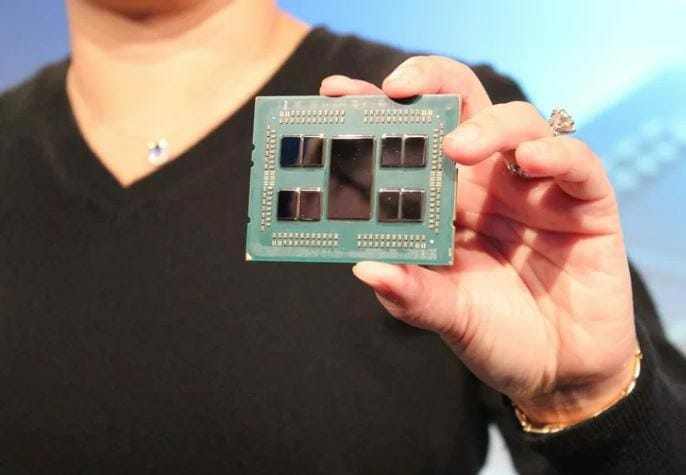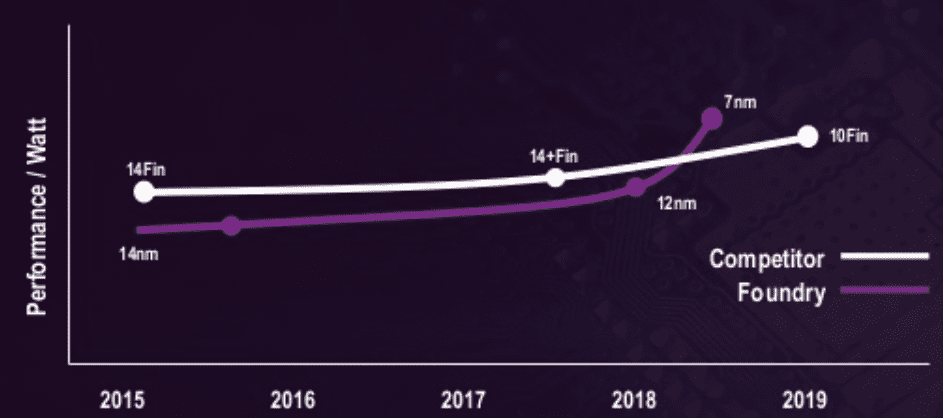AMD has finally come out with the very first details regarding its plan for the next 3-4 years. This year we saw the release of Nvidia’s RTX line of GPUs and on the processor side of things, Intel released their Coffee Lake refresh CPUs with the fastest gaming processor currently being the Intel Core i9-9900K. We have been expecting AMD’s answer to Nvidia and Intel’s latest releases and it is finally here, well sort of. Let us see what AMD’s 7nm Zen 2 CPU and the new MI50/MI60 GPUs bring forth in the near future.
Just recently, AMD finally rolled out the first details of what it intends to do for coming years with its CPUs and GPUs. In a Horizon Event held at San Francisco, the company outlined its plans regarding the first ever AMD 7nm process based processors. Not only that, their upcoming GPUs, Radeon Instinct MI60 and MI50, are also based on a 7nm process.
AMD’s 7nm MI60 and MI50 GPUs
According to the event, AMD is working on what they are calling the Radeon Instinct MI60 and MI50 GPUs. The catch here is that although they are calling them graphical processing units, their functionality, however, will be used elsewhere say machine learning, high-performance computing, and rendering applications. This might be a bummer for gamers but this is not to say that the GPUs will not be able to run games, on the contrary, they might offer good performance but that is only one side of the coin the other being the cost which we will come to later.
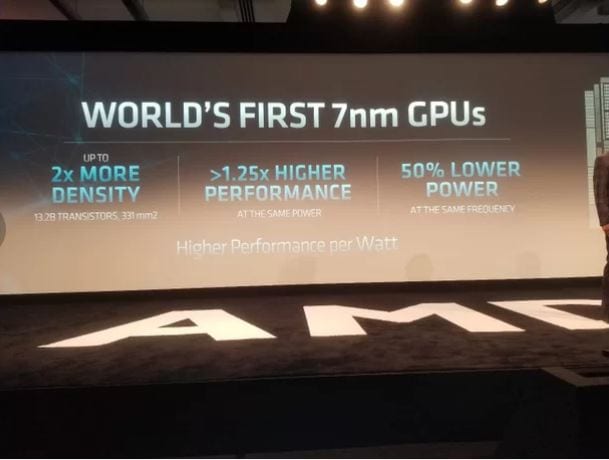
Let us take the MI60, it will come equipped with 32GB of ECC HBM2 (second-generation High-Bandwidth Memory) and 1TB/s memory bandwidth. It will support the unprecedented PCIe 4.0 interface which is expected to double the data transfer rate of the currently used PCIe 4.0 interface.
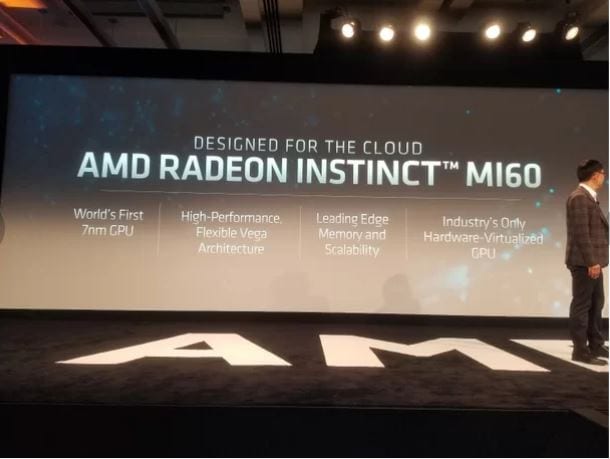
The second GPU, MI50, is almost the same story with the exception of it having 16GB of EEC HBM2 memory. Both the GPUs are based on the advanced Vega architecture and are the first to support PCIe 4.0 GPU on the market. The two GPUs are also the first to use the Infinity Fabric over the external PCIe bus and the first GPUs to have 1TB/s of memory bandwidth. Infinity Fiber will offer up to 200GB/s of bandwidth (three times more than PCIe 4) between up to 4 GPUs.
All of these specs sound extremely impressive, however, the GPUs are not meant specifically for gaming so gamers would have to look elsewhere. This is a bit disappointing from a gamer’s perspective because gamers were expecting AMD to get back into the market and rival Nvidia’s RTX line. The competition would have served for lower prices and better availability. However, that is not going to be the case as these GPUs will be used in research and machine learning oriented applications. In theory, you could pick one up and use it for gaming but these cards will by no means be cheap. They are specialized for a highly advanced market and you would be much better off using an RTX card.
Moreover, The cards will support a variety of data types for computation; from neural networks to machine learning, there are half-precision 16-bit floating point and 4- and 8-bit integer support; for HPC workloads, there’s single (32-bit) and double (64-bit) precision floating point. AMD claims that the MI60 will be the fastest double-precision accelerator at up to 7.4TFLOPS, with the MI50 not far behind at 6.7TFLOPS.
Furthermore, built-in support for virtualization was also talked about in the event, apparently, the new GPUs will have the ability to be shared among multiple virtual machines. This means that a single card will have way more application when it comes to cloud operators who work with several different virtual machines at a time.
AMD’s 7nm Zen 2 CPU
Coming to the CPUs, AMD announced its forthcoming Zen 2 Architecture based processor. AMD released their Ryzen line of CPUs just last year which is based on the Zen 1 architecture. The original goal of the Zen 1 CPUs was to at the very least rival Intel’s processors at the time. Although AMD somewhat lagged behind in that respect, the substantial cost difference, however, gave Intel a run for its money. The original Ryzen CPUs became an instant favorite among gamers for its price to performance ratio and they are still liked by many even though Intel has the upper hand in the raw performance department at the moment.
Now with Zen 2, AMD is ambitious and claims that not only will their Zen 2 processors rival Intel’s, but it will also outperform them in certain aspects such as memory channels and I/O bandwidth. The central key to this is AMD’s implementation of the 7nm process which gives it a huge performance lead when compared to the current standard of CPUs. The 7nm process will offer twice the transistor density of the 14nm process the original Zen parts used and what Intel’s current 9th gen processors use.
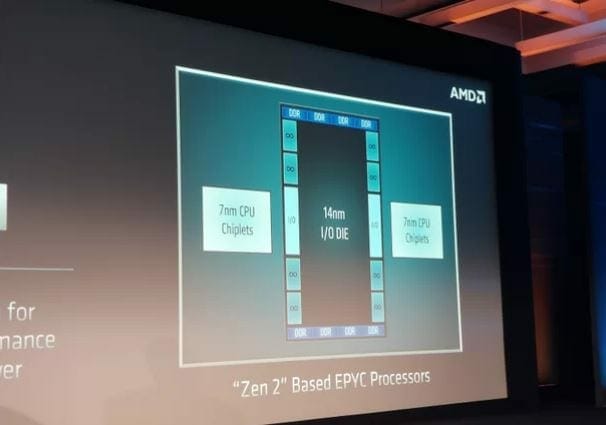
The 7nm Zen 2 CPUs will use half the power of 14nm processors but offer double the performance. This is a significant jump performance wise. Similarly, the TDP will also decrease significantly in the 7nm processors as compared the 14nm ones.
Zen 2 will also address certain weak aspects of the original Zen. For example, the original Zen used 128-bit data paths to handle 256-bit AVX2 operations; each operation was split into two parts and processed sequentially. In workloads using AVX2, this gave Intel, with its native 256-bit implementation, a huge advantage. Zen 2 doubles the floating-point execution units and data paths to be 256-bit, doubling the bandwidth available and greatly improving the performance of this code. For integer workloads, branch prediction and prefetching have been made more accurate and some caches enlarged.
In short, AMD is going to steer the market back in its favor with the release of its 7nm CPUs, however, the GPUs are a different story since they are not meant for the common consumer.
AMD’s 7nm Zen 2 CPU and MI50, MI60 GPUs Release Date and Price
The MI60 will be shipped to datacenter customers towards the end of 2018. MI50 is expected a little later but should be available by the end of Q1 2019. Whereas, AMD has stated that Zen 2 is sampling now, with processors due to hit the market in 2019. However, no specific date was provided.
As for the pricing, AMD has made no comments and we are expecting to hear more from them in the coming months.
Let us know in the comments what you think about AMD’s 7nm Zen 2 CPU and the upcoming Radeon Instinct GPUs.

